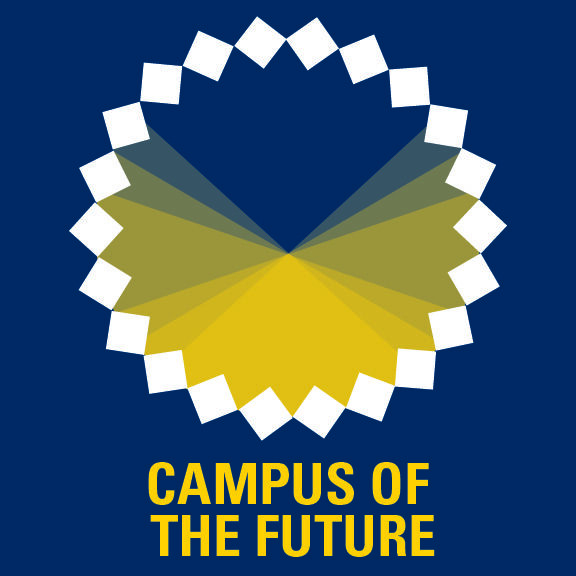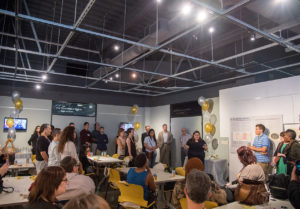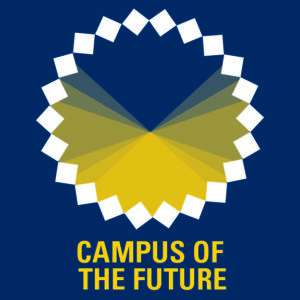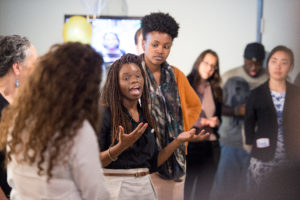
A student hopes to find out how cities like Detroit that experience bankruptcy or other economic hardship “get made and unmade and remade anew.” Another wants to examine the geography and politics of urban demolition, specifically how backfill materials are chosen and distributed in blighted areas. A third student plans to explore music writing and themes of racialized death, spirituality, horror films, and rage during the 1990’s.

A unique co-learning space will encourage students to share the work they are doing in Detroit with one another.
These and nine other projects will be launched this summer as part of the Detroit City Study, the first undertaking of a Campus of the Future focus that challenges U-M students to think about the role of universities over the next 50 years. The four humanists, four social scientists and four education scholars will conduct the work in a new space intended to foster what program leaders call co-learning.
Students across campus were invited to help design the campus of the future as part of the university’s bicentennial. Most of the concepts are still being formed and will be revealed when U-M celebrates its 200-year anniversary in 2017. But one group was itching to get rolling and offers a first look at how education can be transformed in the here and now.
Twelve graduate students will lead research projects this July and August as part of the Detroit City Study. In its simplest form the study is a space in the U-M Detroit Center that will bring the students together to conduct research in three overarching areas—Learning in the City: Urban Education, Place-Making and Sustainable Humanities.
But project organizer Shira Schwartz said having the students in one place is about more than logistics. It’s about the opportunity to be a presence in the heart of the city, working with the community, in an academic incubator in which the students can feed off of one another.
“A challenge for academia is to think of how we can encourage people to talk to each other more. We don’t really have graduate student collaboration space,” said Schwartz, a doctoral candidate in comparative literature. “But when we do get together there’s a kind of academic storytelling that leads to new collaborations that have the potential to be more relevant and useful. There is a thirst among graduate students to do real educational work in the community that they are not always getting the opportunity to do.”
As city study stewards who will receive a $1,500 stipend to conduct their research, the students will collaborate and engage with peers and the community as they tackle subjects like the importance of green spaces, arts as a community revitalization catalyst and the impact of education reform on a beleaguered city.
The Detroit City Study is built on the concept of co-working. In many communities, organizations have created spaces for freelancers and employees without local business headquarters. In many cases, these spaces are simply offices where people can do their work, but others are shared by people who have similar values, who will use them to work independently while taking advantage of the synergy of having multiple projects in the same space.
Schwartz said the project blends theories of pre-modern and contemporary Jewish collaborative learning with these co-working space models, creating a concept that positions knowledge as a practice of sharing.
 “The Detroit City Study gives us a perfect glimpse of the campus of the future,” said Mika LaVaque-Manty, associate professor of political science. “It’s a blend of scholarship and social engagement that involves collaboration across the boundaries of disciplines, communities, and spaces. And it’s student-initiated.”
“The Detroit City Study gives us a perfect glimpse of the campus of the future,” said Mika LaVaque-Manty, associate professor of political science. “It’s a blend of scholarship and social engagement that involves collaboration across the boundaries of disciplines, communities, and spaces. And it’s student-initiated.”
Other concepts that explore the future of the residential research university will be shared during a colloquium Oct. 26, 2017. Students are lead by faculty mentors LaVaque-Manty and Joanna Mirecki Millunchick, professor of materials science and engineering and and faculty director of M-STEM Academies in Engineering. Both have also been named Presidential Bicentennial Professors.
SPONSORS: Institute for Humanities, Office of the President, Rackham Graduate School, University of Michigan Bicentennial, Campus of the Future, Vice Provost for Global and Engaged Education, and the Vice Provost for Equity, Inclusion and Academic Affairs.
The Projects
These are the humanities, social science and education projects proposed by students representing more than 10 programs and departments and four different schools within the university:
- Mikell Hyman, Sociology, will collect and analyze archival and interview data pertaining to Detroit’s 2013 bankruptcy to explore the hypothesis that intellectual elites (accountants, appraisers, consultants, economists) shape urban development trajectories in meaningful ways by mediating relations of trust and control between political and economic elites.
- Samantha Hobson, Sociology, plans to conduct a social-ecological analysis of how access to community green space in urban environments can alleviate the cognitive burden of people of color and enhance the social, physical, and mental health of individuals and the broader community.
- Shebani Rao, Sociology, will interview art advocates, foundations and community members to examine the connection between art and community development, to understand why art has come to be viewed as a public good, and explore which communities and groups are benefiting from Detroit’s (re)emergence as a hub for art and creativity.
- Michael RJ Koscielniak, Urban and Regional Planning, will examine the geography and politics of urban demolition. He will study how backfill material used to complete residential demolitions in Detroit is identified, approved and distributed, and how the movement and regulation of this material raises important questions about democracy, land, property and territory.
- Kelly E. Slay, Higher and Postsecondary Education, will examine how Michigan’s affirmative action ban (Proposal 2) affects recruitment and enrollment decisions among black undergraduate students admitted to U-M. She plans to wrap up a collaborative study on education reform and school closure policy in Detroit over 35 years. She is interested in how educational policies shape the outcomes and experiences of black students across the educational pipeline.
- Gloria Elena Toriche, Educational Foundations, Administration, Research and Policy, will focus on Artist-Scholar-Activist Malaquias Montoya, one of the founders of Chicana/o Social Serigraphy and the Mexican American Liberation Art Front. Her goal is to understand Montoya in order to chronicle his contributions to the under-researched “pedagogies of the movement,” teachings generated from a collective civil rights struggle, assertion of community sovereignty, and project of cultural reclamation known as the Chicana/o Movement.
- Tabitha C. Bentley, Education Policy, Leadership and Innovation, will examine how Washtenaw County takes on President Obama’s My Brother’s Keeper (MBK) Community Challenge, an initiative to improve opportunities for young men of color. She also is participating in the MBK Detroit Innovation Challenge, and will use lessons from both programs to consider how dynamic research can capture and contribute to the communities in which it is being done.
- Dana Nickson, Educational Foundations, Administration, Research and Policy, will examine black youth perceptions of education reform in Detroit city schools. She will focus on how students understand dynamics of school choice, resource allocation, and school climate in their daily schooling and community experiences. She also plans to conduct interviews for a community-based research project examining an education group’s impact on the education policy narrative in Michigan and Detroit.
- Peggy Lee, American Culture, plans to work on a music writing project for 33 1/3 that ties Detroit and New York City to themes of racialized death, spirituality, horror films, and rage during the 1990’s. This will include interview research with Detroit-based musicians and fans.
- Mariane Stanev, Comparative Literature, will look at how documents, songs and literary works from the early colonial era shaped and reflected communities at that time, and how society is still influenced by those standards. She hopes to find out to what extent things like city planning and the cultural landscape in Detroit may reflect the standards of “colonial baggage.”
- Joseph Richard DeLeon, Screen Arts and Culture, will research the histories and cultures of media activism in the post-industrial city. His current research focuses on Detroit since the 1960s. He engages with the effects of capitalism on the built environment of Detroit and local responses to urban blight across a range of media texts and platforms.
- Chris Campbell, Political Theory, plans to continue studying political and social processes that shape intuitions about the world we live in, blending the perspectives of the radical left with classical theories of democracy. This involves examining classical texts through the lens of practice and experience in order to emphasize moments of struggle and controversy in democratic politics.



